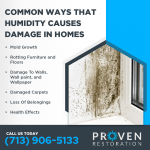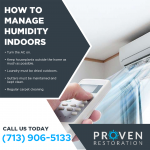Humidity is always being talked about. Humidity is the concentration of water vapor in the air. Whether humidity is low or high there are complaints about it. Humidity or dampness (water vapor) in the air provides enough moisture for mold to grow. Relative humidity measures the amount of water about the amount of water vapor that can be held. Indoor relative humidity should be below 60% ideally. A level between 30 to 50% is ideal.
The Building Science Corporation says that humidity of 70% or more adjacent to a surface can lead to serious property damage. Humidity is an unseen cause of damage in buildings. When the humidity goes unnoticed it can lead to the need for water damage restoration and mold remediation.

This article by Proven Restoration LLC in Spring Texas explains how humidity can cause mold growth and water damage.
When Does Humidity Rise
- HVAC systems are supposed to remove moisture from the air before it gets distributed throughout the building. When HVAC systems are turned off for cleaning that involves large quantities of water, like mopping or shampooing carpets, humidity levels can rise.
- Humidifiers
- Steam radiators
- Moisture from appliances like dryers
- Moisture that is generated when cooking and showering indoors
The following are common ways that humidity causes damage in homes:
Mold Growth
Mold are fungi that are present everywhere. However, moisture and damp surfaces offer perfect conditions for their growth. High humidity, warmth, and a food source ensure mold will thrive. Homes with basements or crawl spaces have a higher chance of moisture in them. They draw moisture from the ground and as they are poorly ventilated they retain humidity in the air. This leads to mold. Mold infestation around HVAC systems, refrigerators, dishwashers, near sinks, tubs, faucets, and other high moisture areas indicates high humidity levels indoors. Once the mold is seen a professional mold remediation service can be called in to ensure that further complications do not develop.
Rotting Furniture and Floors
High humidity leads to excessive moisture indoors that causes staining, mold growth, and decay of wood. When there is excess moisture for long periods due to humid interiors hardwood floors, wooden furniture and fittings, and windows can all get irreversibly damaged.
Damage To Walls, Wall paint, and Wallpaper
High humidity can cause pockets of moisture within walls. When humidity is high and warm air meets a cooler surface condensation occurs. The resulting moisture on walls, especially exterior walls, causes paint to flake. Curling wallpaper or peeling wallpaper also can be a sign of humidity. These signs of water damage need the underlying cause to be identified and addressed, rather than just cosmetic management. Water damage restoration specialists can help, and if they identify mold growth, mold remediation may be needed.
Damaged Carpets
Carpets can get damaged in ways that may be initially unnoticed. Mold, bacterial growth, rippling, and stains may be seen in carpets exposed to high humidity. Damp carpets can also attract pests.
Loss Of Belongings
Clothes, food, and all other objects stored in humid interiors can get spoiled quicker. Food gets stale, wood warps, clothes become musty, and metallic objects can get rusted.
Health Effects
Humidity and moisture indoors can cause health effects on residents. Airborne spores of mold can travel in the air and be inhaled which can lead to health effects.
How To Manage Humidity Indoors
Turn the AC on
Keep houseplants outside the home as much as possible.
Laundry must be dried outdoors.
Gutters must be maintained and kept clean
Regular carpet cleaning
.png)
High humidity will usually cause water damage when condensation happens. If the water damage is minimal DIY measures may be enough. Humidity will most probably cause mold growth that may be evident or hidden. A mold remediation expert has to handle mold growth. In the Houston metropolitan area including in Spring, TX Proven Restoration LLC offers the best mold remediation services. They can be contacted by email at tracy@proven-re.com or a phone call at (713) 906-5133.
































